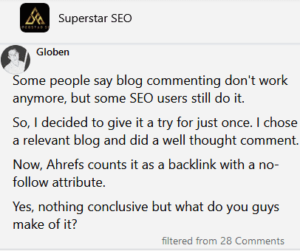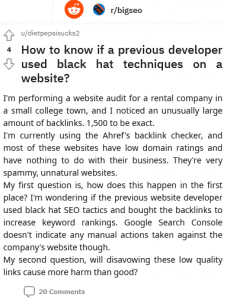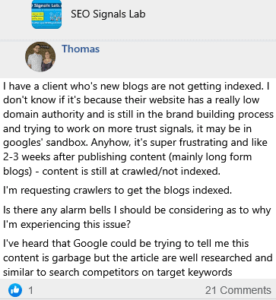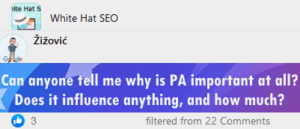Katrina
I recently heard someone recommend commenting on blogs that were relevant to your target audience but with a high DA, to generate backlinks to your website.
Is this good practice? Seems a bit "old school" to me, seeing as a lot of comments on blogs are spam? But I may be wrong!
13 👍🏽 13
[filtered from 16 Answers]
Mike
It's low quality spam. And DA has nothing to do with the quality of a link. Third-party metrics are highly inaccurate, but if you are going to use them it makes way more sense to use page-level metrics. Google looks at the strength of the page, not the domain, when determining the strength of a link.
Shen
I'd still suggest doing 4-8 just for the fact interested people may click through on relevant articles if your comment is of good info
Good for gaining new subscribers
Good for gaining new visitors to cookie and retarget
Good for a mention
Good for reaching out to that blogger in the future for collaboration, guest post or other
It takes 5 minutes and could drive a bit of traffic not tsunami traffic but good quality traffic
Ben Allen 🎓
Blog comment links as a tactic in and of themselves haven't really worked in years.
A lot of people getting into SEO don't really know a lot about link building, and who can blame them? It's an ever-moving target and one of the most important SEO factors since the algorithm was invented that doesn't even really use Search Engine Optimization (SEO) in its execution. It's basically online PR.
So a lot of people try a lot of different things they heard about in a kind of haphazard approach. They don't have a plan. They just try things and figure one of them must work. But link building is systemic and really should be looked at as a campaign in its own.
Anyway, one of the goals of any good link building campaign is to make your backlink profile look as natural and diverse as possible. This isn't really a problem if you're taking a 100% white hat approach and have all the time in the world, but unless you're working in-house for a single site, that usually isn't the case. So if you're doing a lot of paid links, for example, and are worried about things like your anchor text ratio, or diluting the number of obviously purchased links to take yourself off of Google's radar, foundational links like web 2.0s, social media, Quora, blog comments, etc can help make it look more natural and diverse. In this, blog comment links can help. But in and of themselves, no, they won't move the dial at all for your rankings.
Not really what you asked for but a lot of questions pop up here about what works and what doesn't with link building because a lot of people don't really know what a good link building plan looks like. It's really a subject all in its own, and takes practice, research, planning, and time.
It's low quality spam. And DA has nothing to do with the quality of a link. Third-party metrics are highly inaccurate, but if you are going to use them it makes way more sense to use page-level metrics. Google looks at the strength of the page, not the domain, when determining the strength of a link.
Lloyd » Mike
I'm asking…doesn't it matter how many comments are on that page previous to yours that determines the amount of link juice you will get from that comment?
Mike » Lloyd
The more links that are on a page, the weaker every link is, so it doesn't just make a difference in how many comments are there before yours, but also how many may show up after yours.
Situations where people use a lot of blog comment links are one of the reasons people see what is commonly called the Google dance. Their links are constantly getting weaker, but then they are usually also building new ones so rankings tend to bounce all over the place.
Lloyd » Mike
wow ok never looked at it like that but that makes sense…thanks for painting a better pic👊🏾💯💪🏾
Katrina ✍️ » Mike
Thanks for this. They recommended commenting on things like supplier blogs or leaving reviews on there 🤷🏻♀️
I think I need to do some more research into DA as I thought it was to do with quality backlinks 🤦🏻♀️
I'm still learning 🙂
Goldsmith » Mike
aren't most of those links nofollow anyway?
Mike » Katrina
DA is a measure of the quality of links pointing to an entire domain based on Moz's link database. It doesn't tell you much about the page your link is on though.
Mike » Goldsmith
Most of the time these days, yes. Even more so a lot of sites are using things like Facebook comments or Disqus which puts them into iframes and they are typically not even read by Google.
By the way, I'll have something over for you tomorrow. Sorry about the delay. Crazy week last week.
Katrina ✍️ » Mike
I see, thank you 🙂
Davi » Mike
interesting, I didn't realize Google looks at the strength of the page, not the domain, when determining the strength of the link.
Is there anyway to find out what the strength of the page is? Any 3rd party plug-ins etc?
I am planning on doing outreaching for a charity website (same way the OP described), but after reading this I'm a bit concerned that it won't be very effective (or I won't be efficient with my time).
Mike » Davi
There is no way to see the strength of a page for sure since Google stopped releasing PageRank data publicly in 2013. You can use third-party page-level metrics at SEMrush, Ahrefs, or Moz as a guide if you want.
I wouldn't get too hung up on it though. If their page or site is relevant to you and they are willing to link to you, just take the link and move on.
Nihil » Mike
DA is easy to manipulate with GSA, I have done it before 😂.
John » Mike
I think you need to research "Google Dance". 🙂
Mike » John
Not at all. There is nothing untrue about what I said.
John » Mike
The Google Dance was the name given to the way Google updated their Algorithms back before they implemented rolling updates. They would save a bunch of updates and apply them all at the same time. This resulted in wild fluctuations in the Search Engine Result Pages (SERPs). The community dubbed these "The Google Dance".
Even Google was in on the name and for a few years did an Event on the Google Campus during conferences held in San Jose. They called these parties "Google Dances".
The Search Engine Optimization (SEO) community has never associated that term with degrading links. Sorry.
Mike » John
I did not say the SEO community associated it with degrading links.
Today, when people talk about the Google Dance they are referring to seeing rankings fluctuate and bounce around. Yes, I'm aware of what it referred to when it originally started being used, but that is not the case today. That was 12+ years ago. I would bet over 90% of the membership in this group are not aware of it ever being used in that context.
When someone sees rankings go from page 2 to page 5, up to page 3, climb to page 1, and then drop back to page 2, most people refer to that as a Google Dance, rightly or wrongly.
What I said was that degrading link strength while also adding new links is a common cause of why people see ranking fluctuations like that.
John » Mike
You're probably right about these members not knowing the history.
I've never heard it used that way until your post and I'm in a lot of these groups. So interesting that it's getting repurposed.
I just hope folks don't get confused because I didn't get that from your comment at all. Seemed much more about the links than the rankings.
"Situations where people use a lot of blog comment links are one of the reasons people see what is commonly called the Google dance. Their links are constantly getting weaker, but then they are usually also building new ones so rankings tend to bounce all over the place."
Mike » John
I was identifying poor quality link building as one cause of rankings bouncing around. Not the only one, but one possible cause.
And as far as the history of a term like that goes and people not knowing it, to be fair, probably 80%+ of the people calling themselves SEO users today just started in the last 6 months.
I'm asking…doesn't it matter how many comments are on that page previous to yours that determines the amount of link juice you will get from that comment?
Mike » Lloyd
The more links that are on a page, the weaker every link is, so it doesn't just make a difference in how many comments are there before yours, but also how many may show up after yours.
Situations where people use a lot of blog comment links are one of the reasons people see what is commonly called the Google dance. Their links are constantly getting weaker, but then they are usually also building new ones so rankings tend to bounce all over the place.
Lloyd » Mike
wow ok never looked at it like that but that makes sense…thanks for painting a better pic👊🏾💯💪🏾
Katrina ✍️ » Mike
Thanks for this. They recommended commenting on things like supplier blogs or leaving reviews on there 🤷🏻♀️
I think I need to do some more research into DA as I thought it was to do with quality backlinks 🤦🏻♀️
I'm still learning 🙂
Goldsmith » Mike
aren't most of those links nofollow anyway?
Mike » Katrina
DA is a measure of the quality of links pointing to an entire domain based on Moz's link database. It doesn't tell you much about the page your link is on though.
Mike » Goldsmith
Most of the time these days, yes. Even more so a lot of sites are using things like Facebook comments or Disqus which puts them into iframes and they are typically not even read by Google.
By the way, I'll have something over for you tomorrow. Sorry about the delay. Crazy week last week.
Katrina ✍️ » Mike
I see, thank you 🙂
Davi » Mike
interesting, I didn't realize Google looks at the strength of the page, not the domain, when determining the strength of the link.
Is there anyway to find out what the strength of the page is? Any 3rd party plug-ins etc?
I am planning on doing outreaching for a charity website (same way the OP described), but after reading this I'm a bit concerned that it won't be very effective (or I won't be efficient with my time).
Mike » Davi
There is no way to see the strength of a page for sure since Google stopped releasing PageRank data publicly in 2013. You can use third-party page-level metrics at SEMrush, Ahrefs, or Moz as a guide if you want.
I wouldn't get too hung up on it though. If their page or site is relevant to you and they are willing to link to you, just take the link and move on.
Nihil » Mike
DA is easy to manipulate with GSA, I have done it before 😂.
John » Mike
I think you need to research "Google Dance". 🙂
Mike » John
Not at all. There is nothing untrue about what I said.
John » Mike
The Google Dance was the name given to the way Google updated their Algorithms back before they implemented rolling updates. They would save a bunch of updates and apply them all at the same time. This resulted in wild fluctuations in the Search Engine Result Pages (SERPs). The community dubbed these "The Google Dance".
Even Google was in on the name and for a few years did an Event on the Google Campus during conferences held in San Jose. They called these parties "Google Dances".
The Search Engine Optimization (SEO) community has never associated that term with degrading links. Sorry.
Mike » John
I did not say the SEO community associated it with degrading links.
Today, when people talk about the Google Dance they are referring to seeing rankings fluctuate and bounce around. Yes, I'm aware of what it referred to when it originally started being used, but that is not the case today. That was 12+ years ago. I would bet over 90% of the membership in this group are not aware of it ever being used in that context.
When someone sees rankings go from page 2 to page 5, up to page 3, climb to page 1, and then drop back to page 2, most people refer to that as a Google Dance, rightly or wrongly.
What I said was that degrading link strength while also adding new links is a common cause of why people see ranking fluctuations like that.
John » Mike
You're probably right about these members not knowing the history.
I've never heard it used that way until your post and I'm in a lot of these groups. So interesting that it's getting repurposed.
I just hope folks don't get confused because I didn't get that from your comment at all. Seemed much more about the links than the rankings.
"Situations where people use a lot of blog comment links are one of the reasons people see what is commonly called the Google dance. Their links are constantly getting weaker, but then they are usually also building new ones so rankings tend to bounce all over the place."
Mike » John
I was identifying poor quality link building as one cause of rankings bouncing around. Not the only one, but one possible cause.
And as far as the history of a term like that goes and people not knowing it, to be fair, probably 80%+ of the people calling themselves SEO users today just started in the last 6 months.
Shen
I'd still suggest doing 4-8 just for the fact interested people may click through on relevant articles if your comment is of good info
Good for gaining new subscribers
Good for gaining new visitors to cookie and retarget
Good for a mention
Good for reaching out to that blogger in the future for collaboration, guest post or other
It takes 5 minutes and could drive a bit of traffic not tsunami traffic but good quality traffic
Ben Allen 🎓
Blog comment links as a tactic in and of themselves haven't really worked in years.
A lot of people getting into SEO don't really know a lot about link building, and who can blame them? It's an ever-moving target and one of the most important SEO factors since the algorithm was invented that doesn't even really use Search Engine Optimization (SEO) in its execution. It's basically online PR.
So a lot of people try a lot of different things they heard about in a kind of haphazard approach. They don't have a plan. They just try things and figure one of them must work. But link building is systemic and really should be looked at as a campaign in its own.
Anyway, one of the goals of any good link building campaign is to make your backlink profile look as natural and diverse as possible. This isn't really a problem if you're taking a 100% white hat approach and have all the time in the world, but unless you're working in-house for a single site, that usually isn't the case. So if you're doing a lot of paid links, for example, and are worried about things like your anchor text ratio, or diluting the number of obviously purchased links to take yourself off of Google's radar, foundational links like web 2.0s, social media, Quora, blog comments, etc can help make it look more natural and diverse. In this, blog comment links can help. But in and of themselves, no, they won't move the dial at all for your rankings.
Not really what you asked for but a lot of questions pop up here about what works and what doesn't with link building because a lot of people don't really know what a good link building plan looks like. It's really a subject all in its own, and takes practice, research, planning, and time.
This may satisfy you: Backlink Types of Web 2.0 Comment Anchor Text and Citations Aren’t Valuable. Are They?
Embed the link of this post





